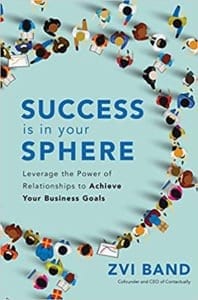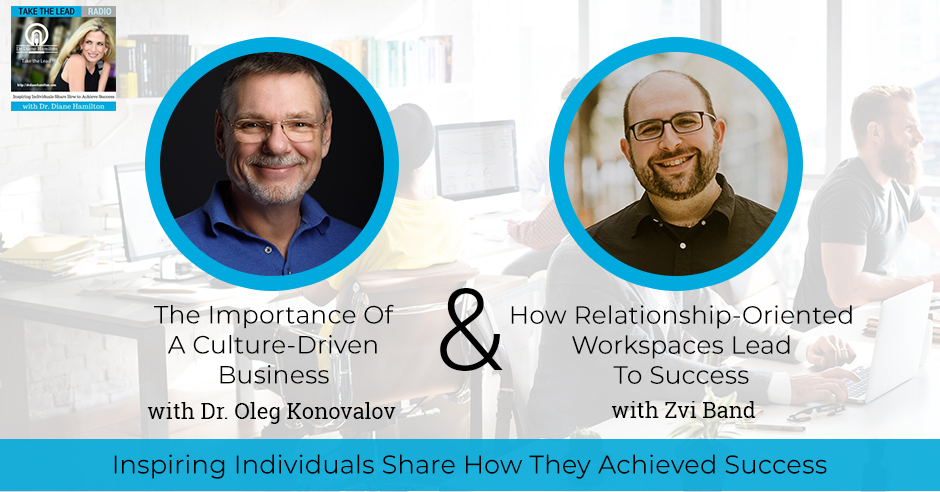Culture and relationships are key to the development of any organization. Thought leader, author, and international speaker Dr. Oleg Konovalov teaches us the importance of culture in all aspects of our life. Dr. Konovalov has over 25 years of experience operating businesses and consulting Fortune 500 companies both in the UK and internationally. Leaning on ideas such as curiosity and the Dunning-Kruger effect, he emphasizes the importance of blending curiosity and culture, and engaging leaders to care in the workplace in order for people to move closer towards development. Listen in closely as he examines how negative and positive culture affects new ideas and a company’s performance.
Zvi Band, the Co-Founder and CEO of Contactually – an intelligent CRM platform for relationship-oriented businesses – recounts how they started their company and its core functions in the real estate arena. Zvi is also the author of Success Is in Your Sphere: Leverage the Power of Relationships to Achieve Your Business Goals. He shares what led him to the creation of Contactually and goes through a relationship-building strategy he acronyms CAPITAL.
I’m so glad you joined us because we have Dr. Oleg Konovalov and Zvi Band. Oleg is the number one global thought leader in culture by Thinkers360. He has some interesting work that ties into culture. I’m very fascinated to talk to him about it. Zvi is the Cofounder and CEO of Contactually. He’s an author of Success Is in Your Sphere.
Listen to the podcast here
The Importance Of A Culture-Driven Business with Dr. Oleg Konovalov
I am here with Oleg Konovalov who is the number one global thought leader on culture. He’s an organizational diagnostic, cultural expert, author and speaker. He’s written a lot of books and I read some of them. They’re amazing. I know I got to review The Trinity of Business. I know he’s also the author of Leaderology. It’s so nice to have you here, Oleg.
I’m honored to be here and I am thrilled. Thank you.
You’re welcome. We have so much in common. We’ve talked before this show and we had a chance to see that we both like to deal with culture engagement and a lot of the things that organizations struggle with. I want to get a little background on you. Where are you from and what led you to this point?
I’m originally from Russia. I lived for many years in the UK. I’m still living between two countries, the United Kingdom and Russia. I’m traveling a lot because of speaking arrangements, consultancy and all these activities. As with the Curiosity Code, everything comes to curiosity as I want to explore something new. That’s about me.
It does and we talked about how many things we deal within an organization. It does come back to that. There are so many people that have these cultures that they’re struggling with in the workplace who haven’t brought it that far back. I think they know that they want to improve motivation or innovation. Do you see a lot of people don’t feel that it’s safe to ask questions?
Yes, but it’s not a big issue. Behind this question is, what is the difference between those who are doing something and those who are not? On one hand, we could say using your language that curiosity moves the road. Those people are eager to know what is behind the scenes. They’re looking from different angles just touching, feeling it and trying to see everything. Another side of this coin is empty promises. We are great on empty promises. We are not curious about what would happen tomorrow but we are promising ourselves like, “I will go to the gym next Monday.” We keep promising this stuff to ourselves and others. Ever so often, we’re taking it for granted and at the end of the days, we’re becoming sick and bored. We’re going to a doctor and they’re telling us, “You should take this medicine,” and we are promising him to do so. We’re not even curious how we will feel, if we will get stronger, cleverer, more knowledgeable or more capable. That’s a huge difference and that moves those things. When our organization is struggling to build a stronger culture, it’s a matter of how curious we are to build something greater for ourselves, for the next generation and move much closer in our development. That’s intriguing.
I watched a YouTube video where you were talking about how kids are hearing no 150,000 times and they only hear 5,000 yeses.
[bctt tweet=”Artificial cultures are worse than negative cultures.” username=””]I’m curious about how people are educated. I noticed that kids, before the age of seventeen, they’re hearing no for about 150,000 times and only 5,000 times they hear yeses. I said, “How would this relate to corporate culture?” If the culture is negative, it says no to new ideas. It’s killing itself and it becomes irrelevant, blind and not prepared for tomorrow. Such a company would die very soon. Whereas positive culture says yes to new ideas and stimulating this curiosity. That’s an interesting angle.
The problem is a lot of people think that they embrace curiosity, but then people don’t feel safe to ask questions. I remember in your book you said that many companies repeat the same mistakes and assume the company will manage itself. I’m very interested in the kind of mistakes you’re seeing companies make over and over again.
First of all, I always thought that the biggest lie in the corporate world is that we’re more talking about negative toxic culture. I was like, “That’s wrong.” I realized that in the biggest instance, we are producing artificial cultures, which are even worse than the negative culture. In a negative culture, big people have some hopes for a better future. They might be suffering and they’re desperate for improvement, but they have hope and they’re still prepared to trust. In artificial culture, those routines and procedures, they’re losing this hope. It goes back to curiosity. How could we increase engagement? When we’re talking about engagement, what comes? We’re talking about engagement itself. Engagement is human energy. The energy of different people combined together as a whole culture. What should I give back to people to get engagement? If we look at the company care for all employees, what do we see?
People are prepared to be engaged if they care. They think about loyalty as a matter of payment. They will perform only to the level they believe their pay is worse. That makes a difference. Immediately, the next question comes, “What is care?” In professional or practical term, it’s simple. It is five elements. It’s the involvement of leaders in their employees. It’s the key for the future in terms of how much you would wire up on the market within a few years for instance. Guaranty your measure for gross, I’m securing your future as a leader as well as emotional comfort, physical comfort and safety. Those are the five simple things. You see many companies which are structured in their approach to care. They’re saying, “We care about our own people.” They’re talking about biscuits and coffee breaks. They’re assuming that giving a company car to an employee makes a difference. It’s not care, it’s a necessity.
I’ve seen a lot of what they thought of as perks, rewards or whatever. It wasn’t what the employees needed to feel engaged. I remember in pharmaceutical sales. It felt like we had the golden handcuffs because you couldn’t find those perks. You felt that you should stay for those perks, but you weren’t engaged in what you did. You didn’t love the job. Employers don’t see that those things need to go together. When you were talking about how to treat people, do you think we should treat employees like we treat our customers? I know people have often said that. Are we seeing too much overpromising? Should it be under-promise and over-deliver? All these things are coming into sales training that I’ve taken in the past and those are all sales techniques. Should we use some of those when we’re dealing with our employees?
No, because you are healing a real human relationship. You are making a script. Do you like to receive a cold call early morning when you’re tired? We’re still craving for a coffee instead of a boozing call saying, “How are you this morning?” It’s not about me. You don’t care about me even as a salesperson because calling somebody early morning or late evening and asking, “Do you need new windows?” You’re saying, “No.” Strangely enough, I’m not being polite in such instances but it’s not fair. When we’re getting married, we are talking with your future wife or your fiancé, “Are you going to do dishwashing?” like ticking a box. Are you saying, “I will take care of you. When you are in trouble, I will help you. If you are tired, you can lean on my shoulder?” You’re relying on certain processes and formalities. When people were taught not to give their hearts and minds but follow certain scripts like robots, it doesn’t help much. It kills culture and it kills engagement because you’re repeating the same story again and again. You’re chewing the same chewing gum again and again. It kills curiosity because you’re becoming arrogant. You’re just like, “I’m not from this world. I’m from where far.”
All of the things that companies try sometimes sound good when they first buy into some of these ideas. It can be helpful to do more of what you deal with. You deal with diagnostics. Did you use that at all? Tell me a little about Leaderology. What’s different about your book, who is that for and what are you trying to accomplish with that?

Culture Driven Business: People are prepared to be engaged if they care. They think about loyalty as a matter of payment.
We’re looking at leadership and we bottomed these things. We’re looking at leadership as some kind of function but the thing is we need to move much further because of realities. We can’t progress further without developing leadership capabilities to a high level. We need to develop a system of serendipity in finding successful strategies and effective solutions as well. It’s a great mixture of vision, competences, intuition, knowledge but everything is focused on people. It’s a necessary dorm of the digital reality. Otherwise, we will end up like hamsters in a wheel running in the same circle again and again without any success.
We will be pleasing ourselves with empty promises, but not moving to present. That’s a bit different. Therefore, Leaderology came up as an answer but the main core of it is we are still having difficulty aligning the organization and its specific nature because organizations have different cultures. We’re not building uniformed culture, but a specific culture where people will be happy to work and leadership, which would be for the girls and not for our own pleasure. That’s important. Everything that was good a few years ago is not sufficient anymore. It’s even causing harm than good.
Give me an example of that because it comes to mind what Marshall Goldsmith was saying, “What got you here, won’t get you there.” Tell me what kinds of things were good a few years ago that are no longer good.
It’s when we develop anything without vision. If we’re talking about vision every day, you need to have a vision. In Leaderology, I’m discussing what vision is and I’m stripping it into six simple but very valuable practical elements because without them, you can’t do much. When you have a vision, which was okay before, but you can’t do anything now without having a vision. That’s the trust instance that we could see. We ignore the role of people before. That sounds like a company went away with debt because of ignoring the roles of people. That’s a huge difference. Whatever business school you go, you will find a very interesting point. No is one discussing the nature of organizations when they’re teaching MBA students, business students or whatever it is.
People are thinking that organizations are similar. Organizations are different. I’m looking at organizations from a biological perspective and I’m discussing them as producers, knowledge-dependent organizations, location dependent organizations, donor-dependent organization and state affiliate because their major is different. You can’t expect the behavior of the university to be similar to the organizational behavior of a supermarket chain or a car maker. That would be ever so different. What’s always demanded on the market and whatever their main resource is very different.
I’m wondering if what impact that has. Let’s say you’re a leader in one industry and you try to switch over another. I was thinking about what you wrote about the Dunning-Kruger effect. We assume we know a lot about it. Do you see that a lot with leaders? They think they know a lot because they knew a lot about one industry, but it doesn’t transfer well.
Absolutely, and it has some epidemic effect because they are bringing from mold practices and wrong assumptions from one industry to another. That affects overall development on a big scale because they have a biased approach on managing different things and that is not appropriate. We all want to be treated as individuals, but organizations alike were so into individuals to some extent as well. They need to be treated precisely to their nature, precisely to their operational principle, precisely to their style and then they will shine.
[bctt tweet=”Culture is beauty that people create together.” username=””]That’s all the empathy type of thing that we talk about trying to treat people as they’d want to be treated. You said, “Biased.” I write about perception as well. I’d like to know your insights on the perception of working in different industries that you deal in Europe and different areas. How is dealing with perception a big impact on companies who want to do business with other organizations in other countries? Do we have preconceived ideas of what we think we should act like in the business world and how people perceive us? Does it differ by country? What are you seeing in that respect?
It’s different from country to country. Let’s look first from the point of the industry itself. For instance, if you talk to modern tech companies, if you go inside and talk with people, the first thing you could hear, “We’re very specific. We’re IT guys.” When you start working with them, you say, “I’m not an IT expert. I have difficulty even switching the computer on and off. Don’t get me wrong. I’m not pretending that I know what your court means, just forget about it. You are human and so I’m talking to you as a human whose role is critically important for a company, for your family and for the society. Let’s make it better. Let’s see what we could do and develop things.” When you talk with people for a minute or two, they forget that they are IT gurus. They’re talking like humans and they become curious about what they can do to improve things. They’re feeling engaged because they see their role in it. I would imagine if such guys would move to another industry and they will never be taught that being a human is an important role, they will take these pre-assumptions because of the result and bring it to a new industry. The people in your industry wouldn’t be welcoming those guys very well because they got their own pre-assumptions. It is a matter to see how the roles of people are overlapping. That’s important.
The voice in our heads and things we tell ourselves is what I was focusing on quite a bit in my curiosity research because it impacts not just curiosity, but so many things. We’ve got these preconceived ideas and that’s why I like discussing the Dunning-Kruger effect. We think we know something, but you don’t know what you don’t know. That’s the problem.
I learned this in a hard way. I spent more than twenty years in the fishing industry, which is very tough. I started on a fishing boat, which was one of the deadliest professions in the world and then adopted the MD position. I went through all the stages and I learned it in a hard way because you are facing new challenges every time. I’ve learned that you need to come to every new project as a child. You need to learn something new from scratch and this world would shine for you. We’re already stepped into this digital era and everything still very uncertain. We need to be able to reinvent ourselves every time we are facing new challenges.
I’m seeing more younger generations accepting that more than I have the older generations because they think that they grew up with so much change that it seems easier almost to them. Do you see a difference by generation?
I was interviewing one of the mature employees in one of the companies who spent 35 years in the industry. He is thinking about retirement, but he’s still young. He’s 55 and he’s saying, “No, I’m not interested in those things. I’m thinking more about retirement rather than doing something different.” It struck me and I said, “You still have the whole energy to do the things differently.” My young guys are teaching students interacting with them often or talking with startups and that’s a huge difference. These guys are still craving for something great. I hope it’s one-off. Surely there are more, but I still have a good opinion of people from the older generation.
I’m sure you deal with a lot of different groups because you speak quite a lot. What’s your favorite topic to speak about?

Culture Driven Business: You need to come to every new project as a child. You need to learn something new from scratch.
I’m strong on the organization and I’m strong on leadership, but I love culture because it’s interesting. That’s what connects people. We’re talking now on a different side of the world. There’s a huge time difference or times zones, but we’re talking without shouting because our hearts and minds are connected at the moment. That’s what culture is all about. That brings us together. That’s a miracle. That’s what we’re creating together. Culture is a beauty that we create together. I believe that strong leaders who are capable to create a strong culture are the da Vincis or the Picassos of management and we need more and more of them. We need much more masterpieces rather than just sketches on fences or dirty walls. We need masterpieces where people would enjoy working. They would love working for such a company and that’s important.
I want people to be able to find you and learn more about you because you have all these amazing books and you’re getting recommended by all of these unbelievable organizations. I want to make sure everybody knows if there are any last words you have and where you’d like people to reach you.
They could visit my website, OlegKonovalov.com. They could find me on LinkedIn on Facebook and I’m always responding. I love talking with people and get experience. I’m open to providing support if I can. I love to have feedback and of course helping because that’s important.
It is important. We met through LinkedIn and I’m very interested in your work. You were nice enough to share your books with me. I got to write a review and that was exciting because I get to read all your great work. I wanted to thank you, Oleg, for being on the show. This was wonderful. Thank you so much for being my guest.
The honor is mine. Thank you very much.
How Relationship-Oriented Workspaces Lead To Success with Zvi Band
I am here with Zvi Band who is the Cofounder and CEO of Contactually, which is an intelligence CRM platform for relationship-oriented businesses. You might have seen him on so many things. He was in the New York Times. You have an impressive background with Contactually. It was founded in 2011 and it was part of the prestigious 500 Startups accelerator. He is also an author of a new book which is called Success Is in Your Sphere: Leverage the Power of Relationships to Achieve Your Business Goals We have something in common because I didn’t see snow until I was in my teens either. It’s so nice to have you here, Zvi.
Were you also someone who didn’t know that you also had to wear pants in the winter too? Coming from San Diego, all I had were shorts and a cold day would be 65 degrees. I remember my first winter and I was like, “Do you mean I have to wear a jacket? What is this?”
[bctt tweet=”Everything that was good a few years ago is not sufficient anymore. It’s even causing harm than good.” username=””]I’m from Arizona so I had to drive to see it. I remember being like, “This is so cool,” then after ten minutes, you’re like, “This is too cold. I need to go back.” We have a lot in common. I mentioned that I have a real estate license. What was your interest in getting into more real estate focus? I know that Contactually is used for other areas, but it’s very strong in the real estate market. Can you give me a little background on that and what led to that company?
Contactually ends up being both used by the top twenty brokers in the country and nine of them are customers of ours. We ended up getting acquired by Compass, which is an incredibly innovative company in the real estate industry. I have no real estate background. No one in my family is in the real estate. I haven’t even bought or sold anything at that time. However, when we started Contactually, it was built around this general idea that relationships are our most important asset and professional contacts, and we need tools to be able to help nurture that. I was reading Geoffrey Moore’s Crossing the Chasm, which I believe every entrepreneur needs to read. I think it’s a requirement.
In order to go for early adopters to early maturity as you’re growing, you need to focus on a niche. We saw this. If we said, “We’re a tool for anyone to help build relationships anywhere,” we would very quickly just try and boil the ocean and fall apart. We saw that we had this interesting cohort of real estate agents. We’re doing our market research. There are 1.5 million real estate agents in the US and $20 billion are paid in commission. The technology industry isn’t necessarily that strong so we said, “We could make an impact if we focus on surveying the residential real estate market.” It’s been an amazing experience since then.
I can’t remember what I used when I was in real estate. Before that, I use all these different things and it’s hard to keep track of everything when you’re in sales and you want something that could connect you. I could see why that would be such a huge market to go into. I can’t think of any other sales job I had that I needed to do it more than that one. I’m curious how you got featured on the front page of the New York Times.
That’s a funny story. If the goal of an entrepreneur is to not just point out a problem but find a way to fix it too, I had no entrepreneurship experience. I didn’t even know that I wanted to start my own company. However, I was fascinated by entrepreneurs and people building companies, so I started trying to suss out what local companies and startups were in the DC area. Initial research showed me that there was none. As I got to know more and more people, it turns out there was a big thriving community of startups, entrepreneurs and investors that most people didn’t know about. You think DC and you think of C-span if not living social or Amazon, which had huge bases in the DC area. To try and help with that, I put together a little brochure cycled proudly made at DC. It ended up rocking up in web traffic and it finally showed for this big city that there was an entire entrepreneurial economy outside of the government world and people were looking into that. That’s the attention that brought me to the New York Times.
You’ve done some amazing stuff. Contactually raised $12 million in venture backing. I was looking at all the things you’ve been named, the Washingtonian Tech Titan. You were on the Washington Post and Washington City Paper. You were a finalist for Ernst & Young Entrepreneur of the Year. These are some big deals. I was also fascinated that you have your own podcast. You interviewed the same kind of people I’m interested in like leaders who have built relationships and move their careers to the next level. Do you focus mostly on real estate or different areas?
We believe that relationships are the most important assets and we’re always looking for ways to help people build and nurture relationships. It happens to be that with Contactually, our biggest market where we are focusing our sales and many efforts is on the real estate industry. We’ve had your cross-pollination and it’s such an incredibly powerful tool that we wanted to make sure that while our biggest audience may be real state, we wanted to bring in diverse opinions and diverse thought leadership. For example in the book, Success Is In Your Sphere, theoretically we could have written a book that only targeted real estate agent and we’re only talking to top realtors. We’re like, “No, we don’t want that.” We want to talk to lawyers, venture capitalists, Hollywood agents, entrepreneurs, consultants and some real estate agents too. One of the most rewarding parts of this journey is that whether I’m talking to a top lawyer of Fortune 500 CEO, an entrepreneur, an experienced real estate agent, they’re all talking the same language about relationships with slightly different dialects. That’s been such an amazing thing.

Success Is in Your Sphere: Leverage the Power of Relationships to Achieve Your Business Goals
When I was in real estate, the first thing they’ll tell you is to leverage your sphere of influence. You need to go around to talk to people who you know. Go to your friends and family. I can remember the training from a long time ago. Networking is such a huge part of being successful in any sales or any business. I was very interested in your book about the power of relationships to build a business. You come up with an acronym of CAPITAL, which is a strategy of relationship building techniques. I want to talk about that. Can we go through the CAPITAL of it all?
The reason why we wrote the book and the reason why the CAPITAL strategy exists is that with our experience with Contactually, you’ll believe that relationships are the most important asset. Of course, it is. With your experience with KW, it’s all about your sphere all the time. What are you doing now to be able to nurture those relationships? What can you do tomorrow? How are you structuring your sphere? That’s where a lot of people fall short. The CAPITAL strategy walks people through this strategic guide. The first C in CAPITAL is Consistency. The biggest mistake that we fall into is that we’ll go off and we’ll send 100 emails to people in the sphere or text messages and follow-up and do all this stuff once and then never again.
If we believe that we are what we repeatedly do, therefore excellence is not an act but a habit. We have to make sure that we’re building consistency. That can be as simple as blocking off time in your calendar to focus on your sphere of influence. The first A in CAPITAL is Aggregate. One of the challenges that we face these days is our relationships are spread all over. We’ve got some on Facebook and some on LinkedIn, then one email account and then our old email account. Our phone has a random set of contacts including high school friends that I haven’t talked to in twenty years. All of these things are your mask. One of the first things that we have to do is we have to be able to aggregate all these relationships into one place. We have the opportunity to build this digital copy of everyone we know.
From there, the P in CAPITAL is Prioritize. When we think about our goals, instead of looking at our network and saying, “Who’s important and who’s not?” We’ve seen that it’s much more powerful to identify the goals that we’re trying to achieve. The types of relationships that will help us achieve those goals and we believe that we can best service with those goals and then identify those exact people that fit those types. That means that it’s not just organizing your relationships, it’s prioritizing. For example, if you’re a real estate agent, not all of your clients are going to be the same. There are some clients that you believe you had a much greater relationship with that have provided you more thrills and are more likely to work with you versus others. That’s the whole point of prioritizing.
You obviously did that with Ryan Hawk because I saw you reach out to him and he reached out to me. We started talking and we were like, “Who do we know?” We connected that way. You practice what you preach and I love that.
Ryan is a perfect practitioner of that too. I have 40,000 contacts into my database, but Ryan was one of those people like, “I want to be around people who I believe are changing the world, who are well-connected and we can help each other get connected to greater groups of people.” That’s obviously how he and I got to know each other. From there, the I in CAPITAL is for Investigate. Once we’ve identified, “Out of all these relationships, who are the ones that we want to spend time with?” What we’re trying to do and what we’re trying to build with these relationships is deeper pour beyond the transaction. Being a real estate agent in your background, it’s about that bedside manner. It’s about understanding who they are and not just trying to fulfill their transaction and that’s it. That’s where investigate comes in because what we’re trying to do is we’re trying to build and maintain rapport with people. What do we do with our friends? We know them and we know their intimate details. We know their family and we know their interests. Nowadays, we can be great at investigating that information and collecting that intelligence.
What kinds of things are you collecting? Where do you get that if you’re saying you know them, but you also look at their LinkedIn profile?
[bctt tweet=”Excellence is not an act but a habit.” username=””]The great thing is it’s all over the place. It’s anything and everywhere. What’s important is that we make a point of doing the research and then collecting it. Of course, you can do your LinkedIn research and follow them on social media. What company are they working for you? Where do they live in the city? What’s going on in that area? What are their sports teams? Honestly, it’s also a matter of collecting what’s in front of us. What I mean by that is when you and I are talking, it’s collecting that small talk and collecting that little bit of pieces of information. For example, you did your research on me and you mentioned that you didn’t know until you are in your teenage years what real winter was like. I could easily forget that but instead, I can make a note in my database. Next time we’re on the call or next time I’m following up the first snowfall or something like that, I can send you a message and say, “By the way, have we figured out how winter is like yet?” That shows that this is much more than a transaction. This is a relationship.
In sales, we learned so much about it that other people can use. If they weren’t necessarily in sales and they’re reading this, it’s so important for relationship building. I tend to type things when I’m on the phone at the same time. I can think and type at the same time and some people don’t and then they forget later. Sometimes it might help us to write a little note down and then type it in later. There are so much we can capture to remind ourselves and some of these CRMs are amazing for what you can keep track of, especially yours. That’s something that so many people don’t do and I’d like to see more of that.
You brought up an interesting tactic that was taught to me. We asked one of our clients what his best relationship strategy was and he said, “To have a small bladder.” What he meant by that is the next time you’re at a dinner or networking event or conference, you’re in your meeting and tracking a lot of people. Be in the moment and be focused if you’re not good at taking notes. After every single interaction, excuse yourself out to the hallway or take yourself out and go to somewhere private. You can even go to the bathroom if you need to. Write down everything that you spoke about. Write every little detail. It’s that stuff that can be gold later on to show that you care about who the person is and you know them and this is not just a transaction.
It’s so easy to text yourself something. You can speak into your phone until you can do something later too. I’m not sure how yours works in terms of that. Is it easy to get into now while you’re in a situation like that or do you have to add in later?
With Contactually, we have an iPhone application and Android application that you can easily tap open and record or tap out a quick note. That’s very easy. For me, I don’t do well taking notes on my phone, so I always have a paper note with me at any point in time. If you’re ever meeting with me face-to-face, you’ll see me writing notes on a paper notepad and then I’ll translate those later on.
I see a lot of bright people do that. It’s a nice thing to keep with you to make little notes. Do you ever look back at your notes and you’re like, “What was I saying?”
Yeah and it’s gibberish. It’s the act of capturing at first and then maybe leveraging later on.

Culture Driven Business: It’s powerful to identify the goals that we’re trying to achieve and the types of relationships that will help us achieve those goals.
What was the next one? We were on Investigate.
The next one is Timely Engagement. This is one of the more challenging parts. If we’re trying to maintain rapport with people, we all know that if we can’t remember what we had for breakfast, how are we going to remember who we met with or the details or worst yet, how are they going to remember us? What we’re trying to do is ensure some regular cadence. Of course, there’s keeping an eye and following them on LinkedIn, Twitter or Facebook. We’re looking for any interesting news that they post or something relevant to them that you can use as an opportunity to reach out, of course. There’s also setting up whether it’s your CRM or Excel spreadsheet or whatever you want to do just to make sure that you’re identifying your relationship that you want to follow-up with first and foremost and then pull those together.
Do you ever do a Google alert to remind you or anything like that?
On key relationships, I’ll have a Google News notifier that if there’s news about their company, they’ll come up. While LinkedIn is of limited value to me in many cases, I will make sure I connect with them on LinkedIn because when someone changes jobs, they’re going to post on LinkedIn. That’s a great data source for me too. Through this CAPITAL strategy, so far we’ve already identified the people that we want to stay in touch with. We figure out through the timely engagement how often or when is the time to engage them. The most important thing and where we have to roll up our sleeves is adding value. We don’t talk about following up. A lot of people talked about follow-up. That’s the base level, but what we’re trying to do in that follow-up in that relationship building is adding value in some way. Even something as basic, remember that we’re all social creatures and we’re trying to show that we care about them.
Sending a message of saying, “Thinking about you,” is enough to trigger that feeling and that little hit of dopamine. Beyond that, it’s identifying where and how we can add value. Whether it’s checking in and seeing if there are opportunities to help them make a connection or doing something valuable by creating a community or inviting them to dinner or some other special experience. As long as we’re trying to make sure that every interaction we have is meaningful, relevant and authentic, we’re going to achieve that objective.
We hear the phrase value proposition and so many things but sometimes it’s overused and nobody comes up with what it means to the other person. It’s a big part of connecting with people to develop empathy and see things from their position of what’s valuable to them. I’ve seen people try to add value to me that isn’t something that I find valuable. Sometimes asking questions and being curious can be important. What do you think about that?
As long as we come from this point of genuinely caring about them. Luckily, the world has shifted that. Relationships are this important thing. Even being in a relationship-driven company, we had to learn that we’re not just trying to score that initial sale and get them to buy Contactually. We want them to buy Contactually, renew Contactually, renew it again, expand and renew it again. Therefore, we had to invest so much more effort in an ongoing relationship in this field of customer success than we did in sales. We also found that if we push too hard to get a sale, what we ended up doing oftentimes is we would build a bad relationship. We’d either be working with people that we weren’t going to make success. They weren’t the right type of customer for us or we would be structuring a relationship that would set up neither of us for success. That was a big challenge for us. Luckily, we’re in this world where we almost required in order to do our jobs to be successful and genuinely care for each other.
[bctt tweet=”Invest the time and effort in people that you think are worth investing your time and effort into.” username=””]This whole CAPITAL strategy is intuitive, but a lot of people don’t do a lot of these things. The final part of this is to Leverage. What does that mean exactly?
You and I both know that relationship felt that this is something that will pay off dividends and change our lives over a medium to a long period of time. Short-term, we see that the work that we’re doing isn’t necessarily paying off nearly. Therefore, we’re much more likely to prioritize things that are much more urgent like the emails in our inbox or push notifications on our phone. With leverage, one of the key things we’re trying to do is if the first C is Consistency, where we’re trying to make sure that we can do it repeatedly, L helps complete that circle by making sure that what we’re doing is easier to do.
For example, if I am reaching out to my sphere of influence all the time with certain messages, instead of writing that message from scratch each time, can I have an email template in my CRM, Gmail or Outlook ready to go that when I want to reach out to them, I can drop in the email template and make a few tweaks based on the notes I see about them and shoot it off? One of the ways I like to help people is by sending up books to them. Could I have a stack of books ready to go in envelopes pre-stamped with the return address already on them? The moment I want to send someone a book, I write a little note card, put in the envelope, close it and then drop it off at the nearest post office. It’s things like that that allow us to gain greater leverage our time and therefore, we’re much more likely to do that in the future.
That gets expensive. Have you noticed how much difference it is to put a personal note in? I do it all the time too because it’s so important. I almost wished Amazon could come up with a way for you to write something personal that’s handwritten to give with these books. Think of how much advantage that would be to somebody like us who are trying to send out personalized messages. Have you found a way around that’s cheaper?
There are services out there that help you with handwritten messages. One of the best-leveraged things I find is to be more measured in who you send it to. I’m going to be honest. I’ve met people who will write a handwritten note to every single person they interact with. While they’re paying the bill at a restaurant, they’ll write a note to the waitress and leave it for her. I’m not that extreme. For me, I want to invest the time and effort in the people that I think it’s worth and I’m willing to invest the time and effort into. With other people, maybe a quick text message or something like that. It’s about being measuring efforts. There are services like Letter Friend that will help you do the handwritten parts.
I had a guest on the show, John Ruhlin, who wrote Giftology. I don’t know if you’ve seen some of the stuff he did. One of the things I thought was great was the knives that I’ve used as a quick gift for important people from Cutco. I’ve done this after he was on the show and that was a cool thing to get people who you care about to see that this is a cool gift. I learn a lot from everybody on the show. I learned a lot from John, from Ryan and now from you, Zvi. Thank you so much for being a guest on the show. A lot of people will want to know how they can get your book and find out more about what you’re doing. Is there some link or something you’d like to share?

Culture Driven Business: As long as we make sure that every interaction we have is meaningful, relevant, and authentic, we’re going to achieve that objective.
I’m easy to find online. The book is Success Is in Your Sphere. You can go on Amazon or Barnes & Noble or your local bookstore and you should be able to find it. You can also visit the website SuccessIsInYourSphere.com. I’m easy to find. Luckily, there’s only one Zvi Band around still so I ranked high on Google results.
Thank you so much for being on this show, Zvi. This was so much fun.
Thanks for having me.
—
I’d like to thank Oleg and Zvi for being on the show. We have so many great guests. If there’s anything you want to know about my work with curiosity, just go to CuriosityCode.com or you can also go to the Curiosity Code information on this site. I hope you join us for the next episode of Take The Lead Radio.
Important Links:
- Dr. Oleg Konovalov
- Contactually
- Curiosity Code
- OlegKonovalov.com
- LinkedIn – Oleg Konovalov
- Facebook – Oleg Konovalov
- Success Is in Your Sphere: Leverage the Power of Relationships to Achieve Your Business Goals
- Crossing the Chasm
- Letter Friend
- John Ruhlin – Previous episode
- Giftology
- Success Is In Your Sphere on Amazon
- Success Is In Your Sphere on Barnes & Noble
- SuccessIsInYourSphere.com
- CuriosityCode.com
About Dr. Oleg Konovalov

About Zvi Band





0 Comments